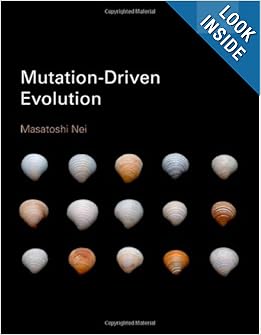 The author is Matastoshi Nei, Evan Pugh Professor of Biology and Director of the Institute of Molecular Evolutionary Genetics, who seems well-connected in the science world :
The author is Matastoshi Nei, Evan Pugh Professor of Biology and Director of the Institute of Molecular Evolutionary Genetics, who seems well-connected in the science world :
The purpose of this book is to present a new mechanistic theory of mutation-driven evolution based on recent advances in genomics and evolutionary developmental biology. The theory asserts, perhaps somewhat controversially, that the driving force behind evolution is mutation, with natural selection being of only secondary importance. The word ‘mutation’ is used to describe any kind of change in DNA such as nucleotide substitution, gene duplication/deletion, chromosomal change, and genome duplication. A brief history of the principal evolutionary theories (Darwinism, mutationism, neo-Darwinism, and neo-mutationism) that preceded the theory of mutation-driven evolution is also presented in the context of the last 150 years of research. However, the core of the book is concerned with recent studies of genomics and the molecular basis of phenotypic evolution, and their relevance to mutation-driven evolution. In contrast to neo-Darwinism, mutation-driven evolution is capable of explaining real examples of evolution such as the evolution of olfactory receptors, sex-determination in animals, and the general scheme of hybrid sterility. In this sense the theory proposed is more realistic than its predecessors, and gives a more logical explanation of various evolutionary events.
Nicolas Galtier, introducing the book at Systematic Biology, offers a psychological explanation for the current obsession with Darwin’s natural selection:
There must be reasons for this, of which one is perhaps historical. To convince people that biological entities were not god-made creatures, Darwin and its followers had to simultaneously argue 1) that living forms change in time and 2) that their adaptations are sufficiently well explained by the process of natural selection. So, the two concepts have been and still are tightly associated in the context of anticreationist arguments. There might also be psychological reasons. Natural selection, unlike divine creation, is not an intuitive idea. Those who adopt it typically like it very much, and can hardly resist coming back to it again and again, finding the living world even more marvelous knowing that it was not generated by a creator. In a way, natural selection has somewhat replaced divine creation in many people’s minds as the process responsible for the beauty of nature.
The new book Mutation-Driven Evolution firmly opposes this view of natural selection as the unique biological creative force. …
You’d have to pay or sign in to read more. Even the review at Trends in Ecology & Evolution is paywalled.